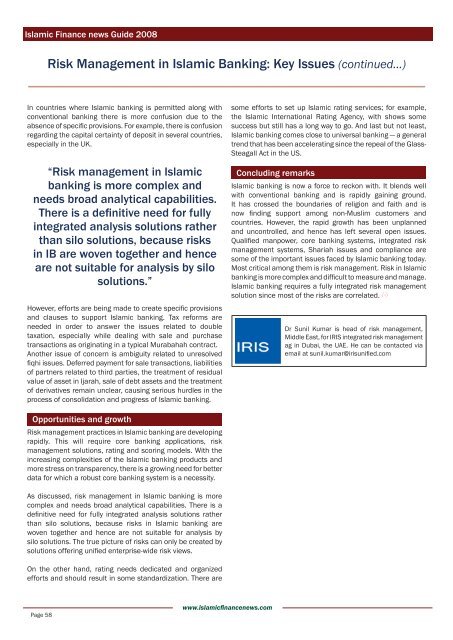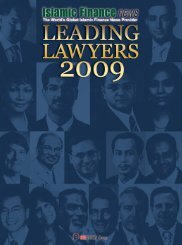Create successful ePaper yourself
Turn your PDF publications into a flip-book with our unique Google optimized e-Paper software.
<strong>Islamic</strong> <strong>Finance</strong> news Guide 2008<br />
Page 58<br />
Risk Management in <strong>Islamic</strong> Banking: Key Issues (<strong>continued</strong>...)<br />
In countries where <strong>Islamic</strong> banking is permitted along with<br />
conventional banking there is more confusion due to the<br />
absence of specifi c provisions. For example, there is confusion<br />
regarding the capital certainty of deposit in several countries,<br />
especially in the UK.<br />
“Risk management in <strong>Islamic</strong><br />
banking is more complex and<br />
needs broad analytical capabilities.<br />
There is a defi nitive need for fully<br />
integrated analysis solutions rather<br />
than silo solutions, because risks<br />
in IB are woven together and hence<br />
are not suitable for analysis by silo<br />
solutions.”<br />
However, efforts are being made to create specifi c provisions<br />
and clauses to support <strong>Islamic</strong> banking. Tax reforms are<br />
needed in order to answer the issues related to double<br />
taxation, especially while dealing with sale and purchase<br />
transactions as originating in a typical Murabahah contract.<br />
Another issue of concern is ambiguity related to unresolved<br />
fi qhi issues. Deferred payment for sale transactions, liabilities<br />
of partners related to third parties, the treatment of residual<br />
value of asset in Ijarah, sale of debt assets and the treatment<br />
of derivatives remain unclear, causing serious hurdles in the<br />
process of consolidation and progress of <strong>Islamic</strong> banking.<br />
Opportunities and growth<br />
Risk management practices in <strong>Islamic</strong> banking are developing<br />
rapidly. This will require core banking applications, risk<br />
management solutions, rating and scoring models. With the<br />
increasing complexities of the <strong>Islamic</strong> banking products and<br />
more stress on transparency, there is a growing need for better<br />
data for which a robust core banking system is a necessity.<br />
As discussed, risk management in <strong>Islamic</strong> banking is more<br />
complex and needs broad analytical capabilities. There is a<br />
defi nitive need for fully integrated analysis solutions rather<br />
than silo solutions, because risks in <strong>Islamic</strong> banking are<br />
woven together and hence are not suitable for analysis by<br />
silo solutions. The true picture of risks can only be created by<br />
solutions offering unifi ed enterprise-wide risk views.<br />
On the other hand, rating needs dedicated and organized<br />
efforts and should result in some standardization. There are<br />
www.islamicfi nancenews.com<br />
some efforts to set up <strong>Islamic</strong> rating services; for example,<br />
the <strong>Islamic</strong> International Rating Agency, with shows some<br />
success but still has a long way to go. And last but not least,<br />
<strong>Islamic</strong> banking comes close to universal banking — a general<br />
trend that has been accelerating since the repeal of the Glass-<br />
Steagall Act in the US.<br />
Concluding remarks<br />
<strong>Islamic</strong> banking is now a force to reckon with. It blends well<br />
with conventional banking and is rapidly gaining ground.<br />
It has crossed the boundaries of religion and faith and is<br />
now fi nding support among non-Muslim customers and<br />
countries. However, the rapid growth has been unplanned<br />
and uncontrolled, and hence has left several open issues.<br />
Qualifi ed manpower, core banking systems, integrated risk<br />
management systems, Shariah issues and compliance are<br />
some of the important issues faced by <strong>Islamic</strong> banking today.<br />
Most critical among them is risk management. Risk in <strong>Islamic</strong><br />
banking is more complex and diffi cult to measure and manage.<br />
<strong>Islamic</strong> banking requires a fully integrated risk management<br />
solution since most of the risks are correlated.<br />
Dr Sunil Kumar is head of risk management,<br />
Middle East, for IRIS integrated risk management<br />
ag in Dubai, the UAE. He can be contacted via<br />
email at sunil.kumar@irisunifi ed.com

















